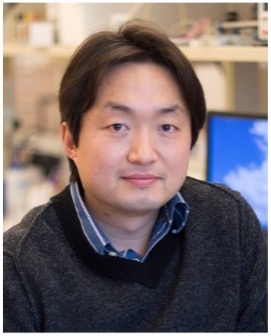January 19, 2023
Westwood Lectures resume with Chi Hwan Lee on Jan. 25
As one of the actions to continue enhancing the intellectual vibrancy of the Purdue West Lafayette campus, President Mung Chiang has announced the Westwood Lecture Series, an opportunity for Purdue faculty to interact with colleagues on scholarly work from a wide range of fields, and the first three of the monthly speakers.
The Westwood Lecture Series started in the past decade and is now resumed post-COVID-19. As before, each lecture will take place 4:30-5:30 p.m. at Westwood, the Purdue president’s residence. Space is limited to the first 75 faculty who register. Registration will open for each lecture one week in advance.
The first three months will feature the following colleagues:
Jan. 25: Chi Hwan Lee, the Leslie A. Geddes Associate Professor of Biomedical Engineering, Associate Professor of Mechanical Engineering, and by courtesy, Materials Engineering, and Speech Language and Hearing Sciences, on “Sticker-like Electronics for Wearable Healthcare.”
Feb. 23: Robert Stahelin, the Retter Professor of Pharmacy, on “Host Lipid-dependent Assembly and Budding of Emerging Viral Pathogens.”
March 1: Mara Faccio, the Tom and Patty Hefner Chair in Finance and Professor of Management, on “Politics and Finance: International Evidence.”
Additional lecturers for future months will be announced in March.
Information about and link to the registration for the Jan. 25 lecture, where Professor Lee will discuss impactful publications in Nature and Science, can be found below:
Registration for the Jan. 25 lecture is available online.
Sticker-Like Electronics (Sticktronics) for Wearable Healthcare
Chi Hwan Lee, PhD
Leslie A. Geddes Associate Professor of Biomedical Engineering, Mechanical Engineering, and by courtesy of Materials Engineering and Speech, Language, & Hearing Sciences at Purdue University
Adjunct Professor of Optometry at Indiana University
https://engineering.purdue.edu/StickTronics/
Abstract. Our lab at Purdue University focuses on bridging a critical gap between engineering and unmet clinical needs through the innovation of wearable technologies. Our scholarly efforts are dedicated to addressing the gap using novel yet simple flexible micro-transducers with a clear path toward translation into measurable clinical impacts. We explore a variety type of wearable biomedical devices that are safely attachable to the skin or even eye, allowing for continuous remote assessment of human health and chronic diseases. The pragmatic application of these devices is boundless, ranging from health care to rehabilitation to telemedicine. In this talk, I will introduce the following topics: (1) sticker-like electronics, or Sticktronics, that are flexibly attachable to curvilinear surfaces of arbitrary places, enabling a variety of pragmatic applications in both industrial and health care sectors; (2) sensory skin patches that are tailored for various clinical needs of particular urgent concerns in the field of telemedicine; (3) smart contact lenses that are built on various commercial brands of soft contact lenses for continuous remote assessment of chronic ocular diseases such as glaucoma; and (4) injectable silicon nanoneedles that are built on flexible and biodegradable patches for painless and long-term sustained ocular drug delivery. In each topic, I will also discuss about the results of detailed experimental and theoretical studies to uncover the essential attributes of functional materials, system-level integrations and clinical implementations.
 Chi Hwan Lee
Chi Hwan Lee
Short bio. Chi Hwan Lee is the Lesli A. Geddes Associate Professor of Biomedical Engineering and Associate Professor of Mechanical Engineering, and by courtesy, of Materials Engineering, and Speech, Language, and Hearing Sciences at Purdue University. He received M.S. and Ph.D. degrees in mechanical engineering from Stanford University in 2009 and 2013, respectively. Before joining Purdue in 2015, he was a postdoctoral research associate in the Department of Materials Science and Engineering at University of Illinois at Urbana-Champaign under the guidance of Professor John A. Rogers. His scholarly efforts are dedicated to addressing unmet clinical needs using novel yet simple wearable devices with a clear path toward translation to produce measurable clinical impacts. He has received prestigious national and international awards including the 2021 Sensors Young Investigator Award, 2020 Purdue CoE Early Career Research Award, 2019 NIH Trailblazer Award and 2019 Korean-American Scientists and Engineers Association (KSEA) Young Investigator Award. He has published more than 70 journal papers and four book chapters, issued five U.S. patents, filed 11 utility patents and co-founded four startup companies. At Purdue University, he has contributed to research grants totaling more than $35 million (responsible for more than $10 million) from a variety range of governmental and industrial sources.

